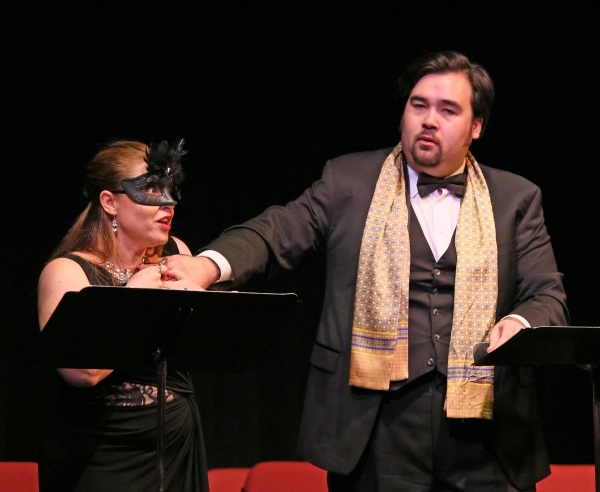
Johann Strauss: Fledermaus. Concert Operetta Theater, Philadelphia 2015
There’s no doubt that Johann Strauss’s Fledermaus (The Bat) is the best of all light comic operas. So why did Philly’s Concert Operetta Theater, a group devoted to this art form, wait 15 years to stage it? Daniel Pantano, the group’s founder, says Fledermaus is so well known that audiences would be able to spot any flaws in its presentation.
Pantano’s fear turned out to be misplaced. His troupe presented the operetta with no missteps and many virtues. This sparkling, bubbly performance was apt for a show that ostentatiously proclaims the virtues of champagne, and this production was even more joyous than those at the Metropolitan Opera or the Vienna State Opera last year.
Fledermaus’s plot is simple: Dr. Falke, who was left lying on a park bench drunk and in the costume of a bat, gets even with the friend who humiliated him, Gabriel von Eisenstein, by publicly exposing Eisenstein’s philandering. What sets the piece apart is its wealth of great tunes and the intricacy with which the music is developed.
The orchestral and vocal writing for eight singers is as sophisticated as most grand operas and is much more advanced than the score of the second-most-popular operetta, Franz Lehar’s Merry Widow. Music director José Melendez put all the complex parts together and shaped a fine production. His pacing was brisk and lilting while allowing breathing room for sentimentality.
The cast was more uniform than those in New York and Vienna, which each had some miscasting. John Myers as Eisenstein displayed a sweet lyric voice with great resonance and carrying power. Brian Ming Chu as Falke was commanding with his warm baritone, crisp articulation, and charismatic acting. Laura Maria Reyes had the voice to encompass the wide range required for Eisenstein’s wife, Rosalinda, while Christina Chenes was a scene-stealer as Rosalinda’s maid, Adele, who dreams of a career as an actress.
Jennifer Hsiung was perfection as the androgynous Prince Orlofsky, the host of the ball at which most of the action occurs. She presented a combination of firm mezzo singing with a straightforward portrayal of ennui much more appealing than the exaggerated, effeminate caricatures seen elsewhere. Jonas Hacker used his ringing tenor to personify Rosalinda’s arrogant lover, Alfred. Garrett Obrycki, William Lim, Thomas Faracco, and Samantha von Adelsberg were fine in supporting roles.
A tradition in Fledermaus is the introduction of guest celebrities during Orlofsky’s party. Here, two singers were planted in the audience and then brought to the stage: soprano Anush Avetisyan and tenor Galeano Salas. Both of these resident artists at the Academy of Vocal Arts interpolated showpiece songs that added to the merriment.
One of the grand moments was “Brüderlein und Schwesterlein” (“My brothers and sisters”) led by Ming Chu toward the end of the ball scene. It’s Strauss’s version of “The Party’s Over,” and its tender sentiments were obvious even to those in the audience who knew no German.
A unique aspect of this production was Pantano’s rearrangement of the text. He left the score’s big numbers in their original German, switching to English for dialogue and songs that explained the plot. Using the English text written in 1950 by Ruth and Thomas Martin as a base, Pantano updated some of the words and added Philadelphia references (to South Philly, the Academy of Vocal Arts, and Mario Lanza). This worked smoothly and enjoyably.
Once again, this modest company has performed a service by reminding us of the musical heritage brought from Europe by our grandparents and great-grandparents.